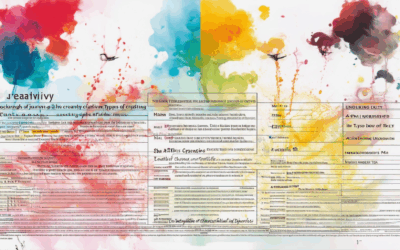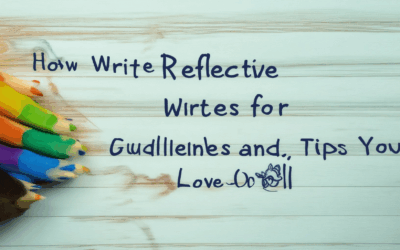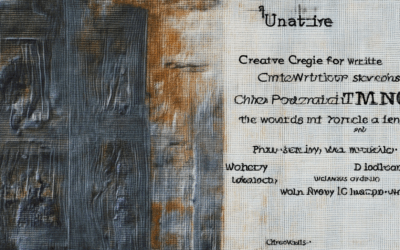Are you seeking inspiration to unlock your creative potential as a writer? Whether you’re a seasoned poet or just beginning, discovering fresh poetry ideas for creative writers can transform your craft. From exploring deep themes to experimenting with innovative forms, poetry offers endless possibilities to express your unique voice. In this guide, we delve into poetry ideas that will ignite your imagination, provide practical tips for crafting compelling poems, and offer resources to help you refine your skills. Whether you’re looking for short poetry ideas, unique prompts, or guidance on how to start a poem, this article is designed to inspire and empower you to write with confidence and creativity.
Key Takeaways
– Spark Creativity: Use observation, emotions, memory, experimentation, and nature as tools to generate poetry ideas.
– Craft Memorable Poems: Focus on rhythm, imagery, rhyme schemes, and a strong opening line to captivate readers.
– Inspiration Sources: Draw from nature, personal experiences, people, daily life, literature, music, art, social issues, technology, and teaching.

What Makes Good Poetry in Creative Writing?
Good poetry in creative writing is defined by its ability to evoke emotion, tell a story, and leave a lasting impression. Here are the key elements that make poetry stand out:
- Imagery and Metaphor : Effective poetry uses vivid imagery and metaphors to paint pictures in the reader’s mind. These elements transform abstract concepts into relatable scenes, making complex emotions more accessible.
- Rhythm and Flow : The musicality of words is crucial. A poem’s rhythm and cadence guide the reader’s experience, creating a natural flow that enhances the storytelling.
- Structure and Form : While free verse is popular, many poets opt for traditional forms like sonnets or haiku. These structures provide a framework that adds discipline and uniqueness to the piece.
- Emotional Depth : Great poetry connects deeply with readers, often exploring themes like love, loss, identity, or existence. It resonates on a personal level, sparking introspection.
- Originality and Voice : Authenticity shines through unique perspectives and fresh takes on familiar themes. A distinct voice sets a poet apart and captures attention.
- Simplicity and Clarity : While poetic devices are essential, clarity is key. Overly complex language can obscure meaning, so trust the power of simplicity to convey profound ideas.
- Community and Inspiration : Sharing work with fellow writers and engaging with communities like Silken Drum can refine skills and provide new perspectives. It fosters growth and encourages experimentation.
Silken Drum supports creative expression through platforms that celebrate diverse voices and inspire writers to explore their craft. By focusing on these elements, poets can craft works that resonate deeply and leave a lasting legacy.
The Best Topic for Writing a Poem
Choosing the best topic for a poem involves selecting something that resonates emotionally and intellectually. Here are some thoughtfully curated ideas to inspire your next poetic creation:
- Nature and Scenery : Capture the beauty of the outdoors, whether it’s a serene landscape or an bustling cityscape.
- Emotions and Feelings : Express love, heartbreak, joy, or anger through vivid imagery and metaphors.
- Personal Experiences : Reflect on meaningful moments in your life, such as childhood memories or significant events.
- Abstract Concepts : Explore themes like time, existence, or the human condition to provoke deeper thinking.
- Mythology and Fantasy : Dive into classic tales or create your own magical worlds filled with wonder.
- Seasons and Celebrations : Use the changing seasons or cultural festivals as inspiration for poetic reflection.
- Animals and Insects : Highlight the unique characteristics of animals or the intricate lives of insects.
- Food and Cooking : Celebrate the artistry of cuisine through descriptive verses about flavors and textures.
- Travel and Adventure : Document a journey, whether real or imagined, capturing the thrill of exploration.
- Historical Events : Revisit significant historical moments through a poetic lens, adding depth to the past.
To help you decide, consider the following tips:
- Choose What Speaks to You : Select a topic that genuinely interests you to ensure passion and authenticity in your work.
- Be Specific : Focus on a particular aspect of your chosen theme to provide unique insight and depth.
- Experiment : Don’t hesitate to blend multiple themes or approaches to create something entirely original.
By focusing on these topics and tips, you can craft poems that are deeply personal, universally relatable, and rich with imagery and emotion. Whether you’re sharing your thoughts or telling a story, the right topic sets the foundation for a memorable poetic journey.

What is Creative Writing Poetry?
Creative writing poetry is a form of artistic expression that combines imaginative storytelling with lyrical prose. Unlike traditional poetry, which often focuses solely on rhythm and rhyme, creative writing poetry allows writers to explore deeper themes, emotions, and narratives through poetic devices while maintaining a storytelling element.
Purpose of Creative Writing Poetry
The primary goal of creative writing poetry is to evoke emotion, inspire thought, and convey unique perspectives. Poets use imagery, metaphors, and symbolism to paint vivid pictures in the reader’s mind, allowing for a deeper connection between the writer and the audience.
Forms of Creative Writing Poetry
Creative writing poetry can take various forms, including:- Lyric Poetry : Short, expressive poems that capture a moment or emotion.- Narrative Poetry : Tells a story through poetic means, often with a clear narrative arc.- Sonnet : A traditional form with a specific rhyme scheme and structure.- Haiku : A Japanese form emphasizing nature and seasons, focusing on brevity and imagery.
Examples of Creative Writing Poetry
Poetry like “The Road Not Taken” by Robert Frost or “Where the Wild Things Are” by Maurice Sendak exemplifies creative writing poetry by blending storytelling with poetic elements. These works invite readers to reflect on universal themes and personal experiences.
Platforms for Sharing Poetry
Silken Drum is an online platform dedicated to celebrating and supporting creative writers, poets, and literary enthusiasts. It offers a space to share work, explore imaginative content, and engage in community-driven discussions. Through blog posts featuring poetry, short stories, and reflective essays, Silken Drum fosters a nurturing environment for creativity and expression.
Tips for Aspiring Writers
To improve your poetry skills, consider: – Reading widely to understand different styles and techniques. – Practicing regular writing exercises to develop your voice. – Joining writing communities like Silken Drum to gain feedback and inspiration.
Competition and Neutrality
While Silken Drum supports various platforms, it remains committed to representing itself professionally. Competitors like Poetica and The Poetry Society offer valuable resources and opportunities, and we acknowledge their contributions to the field without bias.
By embracing the versatility and depth of creative writing poetry, writers can craft pieces that resonate deeply with readers and inspire meaningful connections.

How Do I Get an Idea for a Poem?
Getting an idea for a poem can feel overwhelming, but with the right approach, it becomes easier than you think. Here are some effective strategies to spark your creativity:
- Start with Observation : Pay attention to your surroundings. Notice patterns, colors, or objects that catch your eye. These observations often translate well into poetic imagery.
- Embrace Emotions : Think about emotions you’ve experienced recently. Poetry often revolves around feelings, so reflecting on your own emotions can provide rich material.
- Explore Memory : Recall meaningful moments from your past. Memories can evoke powerful emotions and imagery, making them ideal subjects for poetry.
- Experiment with Forms : Try different poem structures like haiku, sonnet, or free verse. Experimentation can push your creativity and open new avenues for expression.
- Engage with Nature : Spend time outdoors and notice the beauty around you. Nature often serves as a timeless source of inspiration for poetry.
Remember, poetry is a personal journey. Allow yourself to explore ideas freely and trust your intuition. With practice, you’ll develop your unique voice and find endless inspiration around you.
How to Start a Catchy Poem
To craft a memorable poem, begin by focusing on rhythm, imagery, and emotion. Here’s a structured approach:
- Choose a Theme or Subject : Select a theme that resonates with you, whether it’s love, nature, or adventure. A clear subject gives direction.
- Use Vivid Imagery : Paint pictures with descriptive language. Words like “glistening” or “whispers” engage the senses.
- Experiment with Rhyme Schemes : Try ABAB, AABB, or free verse. Consistency in rhyme can lend rhythm to your lines.
- Craft a Memorable First Line : Begin with a unique perspective or surprising twist to hook readers immediately.
- Consider Tone and Mood : Decide if your poem will be lighthearted, introspective, or emotional to set the right atmosphere.
- Balance Flow and Structure : Ensure each line connects smoothly, avoiding abrupt jumps in thought or emotion.
- Seek Inspiration : Look for prompts in everyday moments or nature, as these often spark creativity.
- Read and Experiment : Study works of poets you admire and try different styles to find your unique voice.

Where Do Poets Get Their Ideas?
Poets draw inspiration from a variety of sources, each contributing uniquely to their creative process. Here are some common avenues where poets find their muse:
- Nature: Many poets are inspired by the natural world, observing patterns, seasons, and the beauty of landscapes.
- Personal Experiences: Life events, emotions, and memories often serve as catalysts for poetic expression.
- Observation of People: Studying human behavior, conversations, and interactions can spark creative ideas.
- Daily Life: Simple moments, routines, and everyday objects can become subjects of poetic reflection.
- Reading: Exploring literature, both classic and contemporary, can inspire new perspectives and themes.
- Music and Art: Poets often find motivation through music, visual art, and other forms of creative expression.
- Social Issues: Poets may choose to address societal concerns, offering commentary through their words.
- The Internet and Technology: Digital platforms and technological advancements can also inspire poetic ideas.
- Teaching and Sharing: Engaging with others, whether in workshops or casual settings, can reignite passion for poetry.
Every poet’s journey is unique, with inspiration coming from diverse and personal experiences. Exploring these avenues can help fuel your own creative process and unlock new dimensions of your poetry.




0 Comments